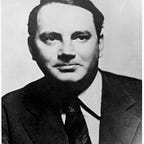They Knew That They Were Twenty, and That They Could Never Die
They met just a few days after Thomas Wolfe arrived in Cambridge to attend Harvard University. Kenneth Raisbeck was the assistant to Professor George Pierce Baker for his 47 Workshop playwriting course. Wolfe biographer Elizabeth Nowell observed that it was chiefly through his new friendship with Raisbeck that Wolfe was accepted by the other students in the Workshop. Between 1920 and 1923 Raisbeck became Wolfe’s best and closest friend. Thomas Wolfe immortalized him as the character Francis Starwick in his second book Of Time and the River (1935). Wolfe wrote of Eugene Gant and Starwick “the only friend of his own age that he had ever known to whom he had fully and passionately revealed his own life, . . . he had never held a friend like Starwick in his heart’s core.”
Kenneth Raisbeck was born January 5, 1899, in Odell, Illinois as the youngest of ten children. His father, Frank Raisbeck, was a hardware dealer from England. Kenneth Raisbeck graduated from the class of 1916 at Bloomington High School in Illinois and went on to graduate Harvard College in 1921 with a Bachelor of Arts degree. According to his passport, he was 5’ 10” tall with grayish eyes, light brown hair, and a straight nose. Wolfe describes Starwick as a “youth of medium height and average weight, verging perhaps toward slenderness, with a pleasant ruddy face, brown eyes, a mass of curly auburn-reddish hair, and a cleft chin.” His voice, Wolfe adds, “was neither very high nor low, it was a man’s voice and yet one felt it might almost have been a woman’s.”
As an undergraduate student, Raisbeck could not enroll in the 47 Workshop, yet he became involved in class productions and was hired as secretary to Professor Baker. During his senior year at college, he traveled to Europe with Baker. His one-act play “Man’s Greatest Hunger,” a tragedy, was well received and performed by the Workshop in Agassiz House theater during the spring of 1920. In his Autobiographical Outline, Wolfe notes the tensions he observed between Baker and Raisbeck, who was considered his most promising student- “two feminines … growing impatience bitterness pique and jealousy.” He noted Raisbeck and another student were “picking up of sailors.” Wolfe also observes at Harvard a “preoccupation of the intellectuals with the problem of homo-sexualism.” Wolfe and perhaps a few others were aware that Raisbeck was gay. It was not an easy time to be openly gay at Harvard. In 1920, the administration formed a secretive disciplinary tribunal to investigate charges of homosexual activity among the student population. Operating behind closed doors, several students were adjudicated guilty and expelled.
In December 1924, on his first trip to Europe, Wolfe went to Paris. Raisbeck was there touring Paris with two friends from Boston, Marjorie Crocker Fairbanks, and Miss Helen Beal Harding. While there on New Year’s Eve, he stumbled upon a drunk and confused Thomas Wolfe on the steps of the Louvre Museum. Wolfe soon joined his fellow American travelers for the next several weeks. The fictional account of their adventures is chronicled in Of Time and the River as Starwick creates tension in the group when he introduces a young Frenchman named Alec, who he picks up in a bar. Eventually Wolfe, upset about the women and their attention to Raisbeck, creates an argument with Kenneth. It does not end well. They continued their travels separately, and Wolfe and Raisbeck never saw each other again after their time in Europe.
Raisbeck had little success as a playwright in New York. In 1923, a drama written at Harvard, “Torches,” received one performance. It was produced in association with The New York Drama League. In the late twenties, he went to California to work as a screenwriter. Later returning to New York, his 1931 work “Rock Me, Julie” played for two weeks on Broadway. He was found dead in a Westport, Connecticut cemetery on September 30, 1931. Reported in numerous newspapers, the cause of death developed into a controversy. The police said he was slain, the Medical Examiner thought it an attack of Meningitis. After a coroner’s inquest, the cause of death was changed to strangulation. The killer was never found. Kenneth was returned home where he was interred by family at Hampton, Illinois.
Wolfe was greatly upset by the news and traveled to Connecticut to speak with police. In a letter to his brother Fred, Thomas Wolfe said of Kenneth Raisbeck “everyone believed he had a great future; but he did nothing with it . . . I have felt very depressed about it: I forgot about the falling out we had and I remembered the time we were both young fellows at Harvard full of hope, and what good friends we were. It seems a terrible thing that his life should end as it did.” In Of Time and the River Wolfe described Starwick as a “rare and tragically gifted creature who was one of the most extraordinary figures of his generation and who, possessing almost every talent that an artist needs, was lacking in that one small grain of common earth that could have saved him, and brought his work to life.”
Richard S. Kennedy, ed. The Starwick Episodes (Akron, Ohio: Thomas Wolfe Society, 1989).
